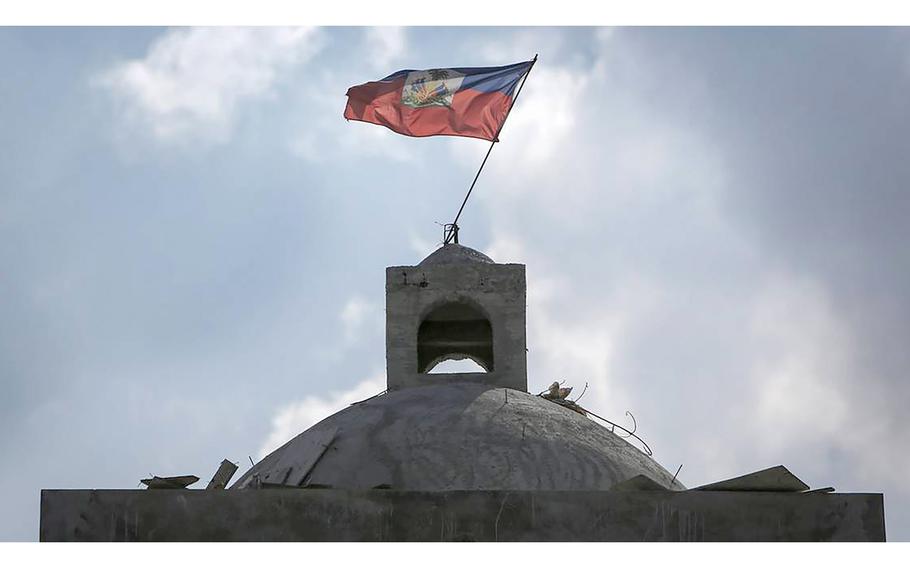
The flag flies atop the Catholic Church in Haiti, rebuilt after it was destroyed in the 2010 earthquake. (Jose A. Iglesias/Miami Herald/TNS)
(Tribune News Service) — Six Haitian nuns and two companions were kidnapped at gunpoint Friday in the nation’s capital, the Roman Catholic archbishop of Port-au-Prince confirmed to the Miami Herald.
The nuns, members of the congregation of St. Anne in Port-au-Prince, were abducted as they traveled on a bus along with a young girl and a driver, Archbishop Monsignor Max Leroy Mesidor said. The incident occurred at around 7 a.m. Friday in Port-au-Prince near Avenue Christopher.
The area is controlled by the Grande Ravine and Village de Dieu gangs. It is unclear which group took the nuns hostage.
In a communique from the Haitian Religious Conference, an association of congregations, President Morachel Bonhomme asked Haitians to pray for the safe return of the nuns and the others, and for the Sisters of St. Anne to find their way out of “the terrible situation.”
“These too many kidnappings fill the consecrated people of Haiti with sadness and fear,” he said. “May the solidarity of the consecrated people of Haiti and the world help them to overcome this harsh ordeal.”
The abduction is the latest act by armed groups in Haiti, which last year were blamed for the killing of nearly 4,000 Haitians and at least 3,000 kidnappings, according to the United Nations. In recent days, attacks have been intensifying in the country’s capital. Since last weekend, several houses in the Solino area have been burned and at least 20 people killed, Pierre Esperance, the head of the National Human Rights Defense Network, said.
Some residents died after being set on fire, and others were executed as they fled their homes, he said.
It’s unclear what triggered the fresh round of attacks, which are being led by the Bel-Air gang, whose leader is a man named Kempes. Bel-Air is allied with the Grand Ravine and Village de Dieu gangs, though Kempes is also currently aligned with Jimmy “Barbecue” Cherizier, who leads the rival G-9 and Family gang coalition.
Solino, home to many police officers, has struggled to remain free from gang control despite its strategic location, which provides routes for kidnapping gangs to move hostages. Callers into local radio stations this week said that while the neighborhood’s cops attempted to stop the deadly raids, they were outgunned by gang members and many residents had no choice but to flee their homes.
On Thursday, as the violence continued, roads around metropolitan Port-au-Prince were blocked by rocks, armed individuals and burning tires. The roads began to reopen by the afternoon.
It was all part of a chaotic day in which anti-government protests flared up other parts of the country following calls by a former rebel leader, Guy Philippe, for Haitians to take to the streets to demand the resignation of Prime Minister Ariel Henry. A convicted felon who was recently repatriated to Haiti after serving nine years in a U.S. prison on drug-related money laundering charges, Philippe has been moving through the country with armed men and police officers in what he describes as “a revolution” to transform Haiti.
On Thursday, protests were reported in the cities of Ouanaminthe in the northeast, Jeremie in the Grand’Anse and in the rural Nippes region.
In its latest briefing of the situation in Haiti, the U.N.’s World Food Program cited Nippes as one of the regions of the countries, along with the south, where the price of basic goods has skyrocketed by 23% since October. Vegetable oil, the agency said, has increased by 66% in the Nippes area since December.
“All four southern [regional] departments have started to experience shortages of essential foods,” the U.N. said.
One reason for the food shortages is an ongoing roadblock in the Mariani district, south of Port-au-Prince. The area has been the the center of gang battles since Nov. 1, forcing thousands of people fleeing their homes. Its main thoroughfare, National Road 2, which connects the south and Port-au-Prince, has been blocked for months and supply trucks are being hijacked.
“Since the first week of January 2024, there has been a shortage of fuel and increases in the price of basic food commodities in relation to that situation,” the World Food Program said.
The deepening humanitarian crisis and social unrest are happening while the U.S. government prosecutes one of Haiti’s gang leaders in a Washington, D.C. federal courtroom. ermane “Yonyon” Joly, who was extradited to the U.S. in the spring of 2022 in connection to the kidnapping of 16 U.S. missionaries, is on trial on charges of weapons smuggling.
This coming week, the U.N. Security Council will again take up the situation in Haiti, the day before Kenya’s supreme court hears a legal challenge to the East African nation’s offer to lead an international deployment of police officers to Haiti to assist the Caribbean nation’s beleaguered national police force.
The Multinational Security Support mission was approved in October by the U.N. Security Council, but its deployment has been stalled by the High Court in Kenya. The court is scheduled to hear arguments on Jan. 26 from a former presidential candidate who claims that the deployment violates Kenya’s constitution and that the country cannot afford to deploy 1,000 of its police officers at a time when Kenya is dealing with its own security challenges.
©2024 Miami Herald.
Visit at miamiherald.com
Distributed by Tribune Content Agency, LLC.